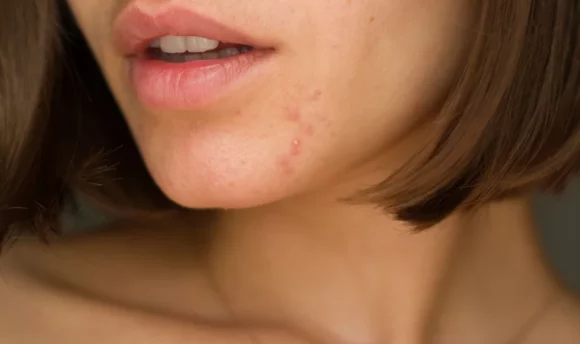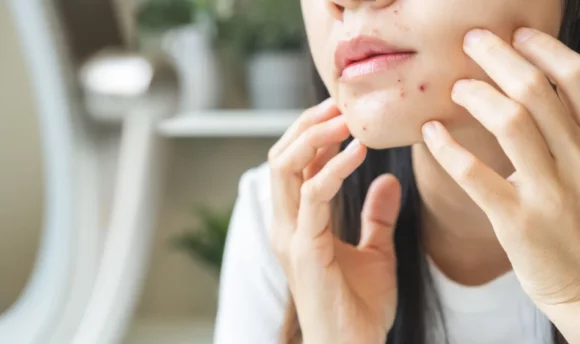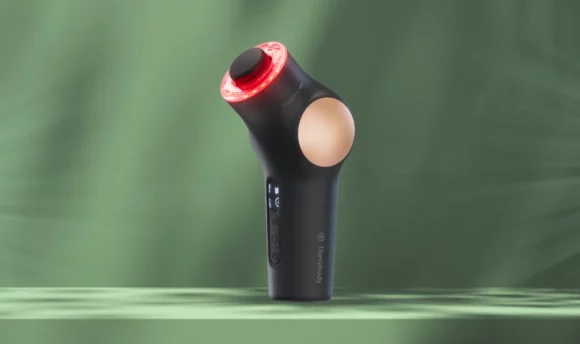Does Sugar Cause Acne? The Bittersweet Truth Behind Clogged Pores
Are you wondering whether eating sugary foods is causing your acne breakouts? Explore the link between sugar and acne, factors that cause pimples, and ways you can prevent acne.

Acne is a common skin condition that occurs when your pores become clogged and inflamed. Greasy skincare products, stress, and genetics are some examples of acne triggers, but you may not realize that your diet also plays a huge role.
Eating the wrong foods, whether that’s candy or breakfast cereals, can give you those dreaded pimples. Meals with a high sugar content could be stopping you from achieving healthy skin. So, is sugar responsible for your acne breakouts?
Discover the link between sugar and acne, along with tips for getting rid of and preventing clogged pores.
Does Sugar Cause Acne? Unraveling the Truth
Sugar can cause acne because it increases inflammation, which encourages your body to produce more sebum oil. Excess oil that sits on the skin can clog your pores and trigger breakouts.
Eating sugary foods doesn’t directly lead to acne. It’s the implications of a high sugar intake that make you more prone to clogged pores, such as the link between inflammation and sebum oil. The overproduction of sebum stops your body from cleaning out the pores and removing any bacteria or dirt.
Too much sugar can also dehydrate your skin and put you more at risk of developing acne. Sugar causes the cells in your body to release more water through urination, leading to dehydration if you don’t consume enough water. Because of this, your pores cannot flush out dead skin cells properly.
What Causes Acne Breakouts?
There are many factors that could aggravate acne. Learning about the potential causes can help you maintain healthy skin. For more professional insight into your acne, speak to a registered dermatologist.
Below are some common causes of acne:
#1 High-GI foods
The glycemic index is a measurement that determines how fast your body breaks down carbohydrate foods. A high rating means the food will cause a blood sugar spike, so it’s important for people with diabetes to use this ranking system when managing their symptoms.
However, those who don’t have diabetes should still avoid high-GI foods when necessary, especially if they suffer from acne. Foods that could affect skin health include white bread, soda, corn chips, cookies, and other forms of junk food.
Research suggests that high blood sugar triggers inflammatory hormones such as cortisol. This stress hormone disrupts normal sebum production and weakens your immune system, which stops the body from efficiently cleaning your pores.
#2 Inflammation
Leading on from the previous point, too much inflammation in your body may damage functions such as your immune system, heart, and gut. Poor immunity can stop you from maintaining healthy skin, but not many people know about the link between your gut and skin equilibrium.
Gut inflammation can weaken your intestinal barrier, which is a protective structure that restricts pathogenic molecules. Because of this weakened layer, undigested proteins and toxins could enter your blood and damage the skin. More toxins on your skin will foster the development of acne.
Some people also have an intolerance or allergy to certain types of sugary foods, meaning they are more likely to experience inflammation-induced acne.
#3 Hormonal fluctuations
Fluctuations in the hormones estrogen, progesterone, and testosterone may cause breakouts such as whiteheads, blackheads, and cysts. These hormones can increase the amount of sebum oil your glands produce, which may clog the pores on your face, shoulders, back, and chest.
Hormone fluctuations can occur during periods, pregnancy, menopause, and puberty. Too much stress and not enough sleep may also disrupt these hormones.
#4 Lifestyle
Certain lifestyle habits can dampen healthy-looking skin. For example, drinking alcohol and smoking regularly will increase the stress hormones in your body. Cortisol, the main stress hormone, promotes excess sebum on the skin. Since this oil just sits in your pores, they can become inflamed.
Not washing your face properly could also cause acne because you’re not removing the dirt or bacteria. Therefore, building a sustainable skincare routine with face washes and moisturizers is essential for smooth skin.
It’s possible that your job is triggering breakouts. Personal trainers are constantly in the gym, which is an environment that fosters bacteria. Chefs in a restaurant may hover over deep fryers that release grease and oil into the air. If you’re working in these types of conditions, you must avoid touching your face.
How Does Sugar Affect Your Skin?
Eating sugar can change your skin in many different ways. Those who are prone to high blood sugar levels should be cautious of what they eat. Consuming high-glycemic foods can cause your body’s insulin levels to suddenly spike, which triggers other health issues such as heart or kidney damage.
The following are some ways sugar can affect your skin:
- Pimples such as cysts, whiteheads, and blackheads
- Dryness from dehydration
- Loss of elasticity due to high blood glucose
- Fine lines and wrinkles
- Rosacea, dermatitis, or psoriasis from inflammation
- Fungal and bacterial infections
- Dullness such as dark circles and loose skin
How to Get Rid of Sugar-Induced Acne
Creating more healthy lifestyle habits can help lower your blood sugar levels and decrease insulin resistance. It’s also important to reduce your sugar intake, and we will share some tips for doing that.
#1 Opt for low-GI foods
Certain foods containing sugar, such as chocolate and cereal, have a high glycemic index that could cause acne. Therefore, you need to choose low-GI foods to improve your long-term skin health.
Low-GI meals comprise oatmeal, apples, blueberries, kidney beans, asparagus, avocado, tomatoes, peanuts, yogurt, and almond milk. Some food packages have a GI symbol, so always look out for that when doing your grocery shopping.
#2 Drink more water
You should drink more water throughout the day to treat acne. Research suggests that water hydrates your skin and encourages your body to flush out dead skin cells. Maintaining hydration will also boost the immune system, which can fight off acne-causing bacteria like cutibactrium acnes.
The recommended daily water intake is 9 cups for women and 12 cups for men. Drinking plenty of fluids does improve your skin, but it also improves other aspects, such as your gut, brain, and heart.
#3 Avoid salty afternoon snacks
Sometimes, you might crave a salty snack after lunch. Foods like potato chips, popcorn, and honey-roasted peanuts may sound delicious, but they won’t benefit your skin. This is because excess sodium dehydrates your body the way sugar does, meaning you’re more at risk of getting acne.
Instead, limit your salt intake as much as possible to maintain high hydration levels. More water in your body can reduce inflammation and related side effects like acne breakouts and insulin resistance.
#4 Eat sweets in the morning
There’s no harm in wanting to eat foods with a high sugar content as long as you reduce your intake and consume them in the first half of the day. Our bodies are most insulin-sensitive in the morning, meaning the liver and muscle cells can metabolize glucose effectively. In turn, you’ll have lower blood sugar levels, even after consuming sugar.
#5 Improve your skincare routine
There are specific products you can use that promote healthy skin. You should start the day by using a gentle face wash and then applying an aloe vera moisturizer to treat inflammation. Other products, like serums and toners, can also remove any stubborn bacteria on your skin. When choosing your products, it’s important to look at the ingredients.
Some of the best ingredients for maintaining healthy skin include:
- Benzoyl peroxide
- Salicylic acid
- Alpha hydroxy acids
- Sulfur
- Adapalene
- Vitamin C
- Glycolic acid
- Tea tree oil
Research suggests that benzoyl peroxide is best for treating acne because it can reduce bacteria and dead skin cells. You can find this ingredient in foaming face washes, treatment gels, and hydrating creams.
How to Prevent Acne
Preventing those dreaded pimples doesn’t have to be a challenging task. Lowering your insulin levels by eating fewer sugary foods can help, but it’s also important to build other healthy habits in your life.
You can prevent acne by:
- Washing your face twice daily
- Drinking more water
- Refraining from harsh scrubbing in the shower
- Changing your pillowcase regularly
- Applying topical treatments
- Reducing your sugar intake
- Learning mindfulness to handle stress better and improve your mental health
- Keeping your hands away from your face
FAQs
Foods such as spinach, blueberries, whole-wheat bread, turkey, pumpkin seeds, carrots, and salmon can help soothe your skin. They usually contain zinc, antioxidants, and vitamin A, which are essential for skin development. It’s better to speak to a registered dietitian about what foods are best for acne.
Processed foods are the worst for acne because they don’t contain many nutrients. Instead, they contain sugars, saturated fats, and refined carbs, all of which promote inflammation. You’re more at risk of having inflamed skin and breakouts when following an unhealthy diet.
Caffeine doesn’t directly cause acne, but it could make inflammation worse. Research suggests that drinking too much coffee may increase the stress hormone cortisol. This hormone can increase sebum oil production, which makes you more prone to clogged pores and breakouts.
A Word From a Dermatologist
Dealing with acne can be challenging, and it may bring down your mood. The sudden appearance of pimples may derive from external factors such as greasy hair or your pillowcase, but it may also come from your diet.
Therefore, re-evaluate what you’re currently consuming. Foods such as cereals and chocolate contain refined sugar that will damage your skin. You can make healthier dietary choices by reducing your sugar intake and focusing on nutrient-dense foods like green veggies and fresh fruits.
It’s also important to seek medical advice from a doctor. They can determine whether spikes in blood pressure and glucose are causing your acne or whether it’s inflammation from an unbalanced diet.
Conclusion
Sugar can cause acne if you have too much of it. The more low-GI foods you eat, the less likely you’ll develop insulin resistance. Symptoms of high insulin levels include acne and recurrent infections, so it’s important to speak to your dermatologist or dietitian about the right treatment.
You should also follow healthy skin habits such as washing your face regularly, eating more clean foods, applying topical treatments from a doctor, and changing your pillowcase to avoid bacteria buildup.

















































 Select your language:
Select your language: 








